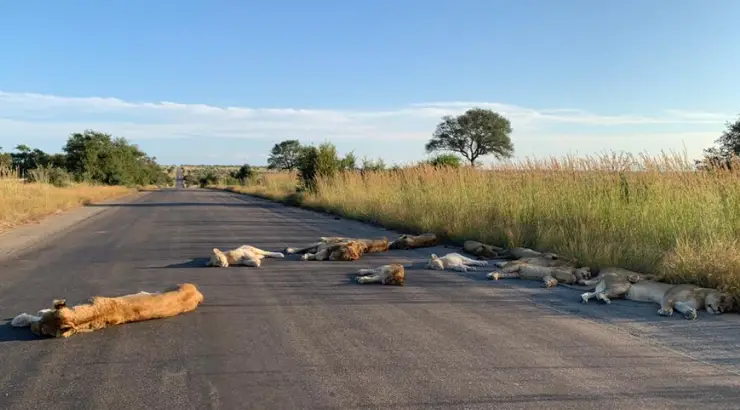The big cats are normally only seen on the road by park rangers at night.

Photo credit: Section Ranger Richard Sowry, Kruger National Park
(TMU) — All over the world we’ve seen animals taking back their own habitats, from crocodiles on the beaches of southern Mexico to bobcats in Yosemite National Park, while humans shack up indoors due to the coronavirus pandemic.
(TMU) — All over the world we’ve seen animals taking back their own habitats, from crocodiles on the beaches of southern Mexico to bobcats in Yosemite National Park, while humans shack up indoors due to the coronavirus pandemic.
And with people laying low and the animal kingdom enjoying a bit of a revival, it was only a matter of time before lions in South Africa had their day in the sun—literally, in this case.
In a new set of photos from South Africa’s Kruger National Park, a pride of lions can be seen peacefully lounging outside in the sun and shade on a road with seemingly no care in the world.
The uncanny photos were taken by park ranger Richard Sowry, who was out on routine patrol Wednesday before stumbling on the strange sight.
The big cats are normally only seen on the road by rangers at night, according to BBC.
Kruger visitors that tourists do not normally see. #SALockdown This lion pride are usually resident on Kempiana Contractual Park, an area Kruger tourists do not see. This afternoon they were lying on the tar road just outside of Orpen Rest Camp.
📸Section Ranger Richard Sowry pic.twitter.com/jFUBAWvmsA
— Kruger National Park (@SANParksKNP) April 15, 2020
In a tweet, Kruger said:
In a new set of photos from South Africa’s Kruger National Park, a pride of lions can be seen peacefully lounging outside in the sun and shade on a road with seemingly no care in the world.
The uncanny photos were taken by park ranger Richard Sowry, who was out on routine patrol Wednesday before stumbling on the strange sight.
The big cats are normally only seen on the road by rangers at night, according to BBC.
Kruger visitors that tourists do not normally see. #SALockdown This lion pride are usually resident on Kempiana Contractual Park, an area Kruger tourists do not see. This afternoon they were lying on the tar road just outside of Orpen Rest Camp.
📸Section Ranger Richard Sowry pic.twitter.com/jFUBAWvmsA
— Kruger National Park (@SANParksKNP) April 15, 2020
In a tweet, Kruger said:
“This lion pride are usually resident on Kempiana Contractual Park, an area Kruger tourists do not see.
This afternoon they were lying on the tar road just outside of Orpen Rest Camp.”
Typically, the park would be abuzz with tourists taking self-guided tours, enjoying picnics, and enjoying attractions ranging from museums to wildlife safaris, and even golf.
Park spokesman Isaac Phaahla told CNN:
“Lying on the road during the daytime is unusual because under normal circumstances there would be traffic and that pushes them into the bush.”
Yet the animals’ behavior isn’t necessarily abnormal despite the striking nature of the photos. Phaahla added:
“They just occupy places that they would normally shun when there are tourists.
People should remember that KNP is still a largely wild area and in the absence of humans, wildlife is more active.”
Earlier this week, similar shots of hyenas and lions hanging out at the Skukuza golf club located within the park were taken by the captain of the golf club, Jean Rossouw. The photos show lionesses drinking from the golf course’s ponds and chasing hyenas across the green.
pic.twitter.com/PfXc0KPLQG
— Kruger National Park (@SANParksKNP) April 13, 2020
Even as the sun rises, without all our human visitors, the urge to sing the 'lion sleeps tonight' is just a whim away, a whim away, a whim away!
📸 ©️ Jean Rossouw; Skukuza Golf Club , Kruger National Park@SANParks pic.twitter.com/M9XiagVqjX
— Kruger National Park (@SANParksKNP) April 13, 2020
Park officials also captured video of wild dogs playing in the area a week before.
pic.twitter.com/hZSlUjMsgx
— Kruger National Park (@SANParksKNP) April 10, 2020
The park has been closed to the public since March 25 as part of South Africa’s nationwide lockdown meant to curb the novel coronavirus pandemic.
In the meantime, various activities ranging from food delivery to fuel provision, security and emergency services, and wildlife crime operations are continuing, according to South African National Parks (SANParks).
In a statement, SANParks CEO Fundisile Mketeni said:
“We would like to thank the public for their on-going support in line with government’s strategy to mitigate the impact of COVID 19, we all have an obligation to flatten the curve.”
And while the park’s seeming conversion back into a land belonging to its creatures may seem idyllic, things haven’t been quite so wonderful for other parks in South Africa.
In the Northwest Province bordering Botswana, nine rhinos were poached from the period spanning just before the start of the lockdown on March 23 to April 8, reports the New York Times. The move came as wildlife conservation groups expressed fears that their funding would shrivel up due to the precipitous drop in tourism.
However, four suspected rhino poachers were arrested at Kruger National Park on March 21, right before the lockdown came into effect.
The country’s count of confirmed coronavirus cases has reached at least 2,500 with at least 34 people dying of CoViD-19, according to health authorities.
By Elias Marat | Creative Commons | TheMindUnleashed.com
The country’s count of confirmed coronavirus cases has reached at least 2,500 with at least 34 people dying of CoViD-19, according to health authorities.
By Elias Marat | Creative Commons | TheMindUnleashed.com
No comments:
Post a Comment